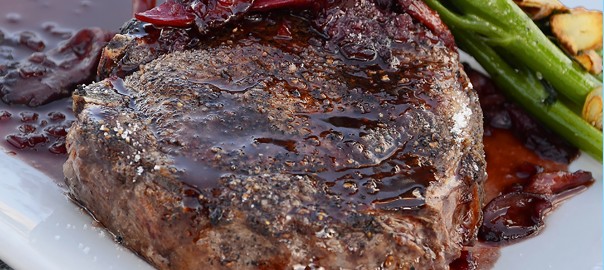Quality chicken, pork, and beef can often be thrown directly on the grill without any seasoning — or with just a pinch of kosher salt and freshly-ground black pepper — and taste amazing. But, an excellent homemade steak marinade — for instance — can take your meat to the next level.
Many steaks can be immensely improved with a little kitchen creativity and some minced garlic or soy sauce. This is especially true of skirt steak, flank steak, and similar tougher cuts with lots of connective tissues.
But if you really want to pack flavor into a grass-fed, grass-finished steak or some pasture-raised, heritage-breed pork or free-range chicken, a little knowledge of how marinades work and which flavor combinations are best can make a standard weeknight meal into a savory, memorable culinary experience.
Is it necessary to marinate steak, pork, or chicken?
Why marinate, you ask? Marinating before grilling is an excellent way to add additional flavors and to get more tender meat.
Marinades work well because of the natural attributes of beef, chicken, and pork, according to Head ButcherBox Chef Yankel Polak. “The longer you leave a protein in a marinade the more flavor it should absorb,” he explains, “and, what’s more, marinating will tenderize a tougher cut of meat.”
The problem is that, in reality, most marinades only penetrate about 2 millimeters deep. “And, get this,” Chef Yankel says, “it all happens in the first few seconds.”
So, while many people think that marinating meat for extended periods of time, or even overnight, is the key to having meat with fantastic flavor, that’s not actually the case. “While there is nothing wrong with preparing your ingredients the day before, remember that a good marinade only needs minimal contact with your protein to do everything it’s supposed to do,” according to Chef Yankel.
A good marinade enhances flavors
While there are many options for chicken or steak marinades, you can pull right off the shelf of your grocery store to have a pretty good meal, making your own marinades is healthier and leads to more flavorful pork chops or a nice juicy steak.
If you can, try to keep the marinades as natural as possible. It would be foolish to take a nice cut of grass-fed steak or heritage-breed pork and then douse it with some combination of corn syrup and lab-made additives.
Keep in mind that different cuts and types of meat have different flavor profiles. Some flavors will work best with, say, a flank steak more so than a ribeye, and vice versa.
“Think about the item you are cooking, whether that’s chicken, beef, or pork, and use ingredients in your marinade that will complement the flavor,” Chef Yankel says.
Flavor profiles for each type of meat
According to our chef, the best complementary flavor profiles are citrus for chicken, sweet flavors for pork, and marinades that are rich and savory for beef, especially grilled steaks.
This is why lime and lemon juices go great with other spices in chicken marinades; pineapple, brown sugar, and maple are great to have in pork marinades; and balsamic vinegar, minced garlic, and mushroom flavors work well as steak marinades.
“While they don’t alter the internal structure of the meat,” Chef Yankel adds, “acidic elements in marinades will certainly give you that extra punch of flavor — the ‘wow’ factor that accompanies that first bite.”
Some flavors that can’t be made from scratch — unless you have time to ferment malt vinegar, molasses, anchovies, and tamarind extract for 18 months. So it is okay to mix some natural ingredients like rosemary or fresh lemon juice with a good soy sauce or Worcestershire sauce.
Using a homemade marinade on your grass-fed steak can change a mundane meal into something otherworldly. Experiment and you might discover unexpected flavor combinations that work wonders for your palate.
And, to save you some precious time, now you also know that you don’t even have to marinate for too long to get those flavorful benefits.
Watch Chef Yankel break down his favorite marinades for chicken, pork, and beef here. In the video below check out an easy steak marinade — that has very little prep time —featuring garlic, cilantro, lime zest and olive oil. According to Yankel, that’s all you need for a delicious steak every time.
Also, here is Chef Yankel’s favorite one-hour steak marinade recipe for grilling New York strip steaks:
- 3 limes, both zest and juice
- 1 bunch fresh cilantro, chopped
- 1 head of minced garlic
- 1 tablespoon black pepper
- 1/4 cup olive oil
- 1/4 cup parsley, chopped
- 1/4 cup chives, chopped
- 4 tablespoons tarragon, chopped
- 4 tablespoons dill, chopped
- 2 tablespoons whole grain mustard
- 1 tablespoon dijon mustard
- 1/4 cup white wine vinegar
- 1/4 cup olive oil
- 1 tablespoon coarse kosher salt
- 1 tablespoon fresh ground black pepper
- Combine all marinade ingredients in small bowl. Mix well and coat steaks thoroughly.
- Allow steaks to marinate in a refrigerator at least one hour, then bring steaks to room temperature before cooking.
- Grill the strip steaks over charcoal or an open flame for 4 to 6 minutes per side, or until internal temperature reads 120°F. Rest steak 8 minutes before serving.
You can find more recipes here. Happy eating!








